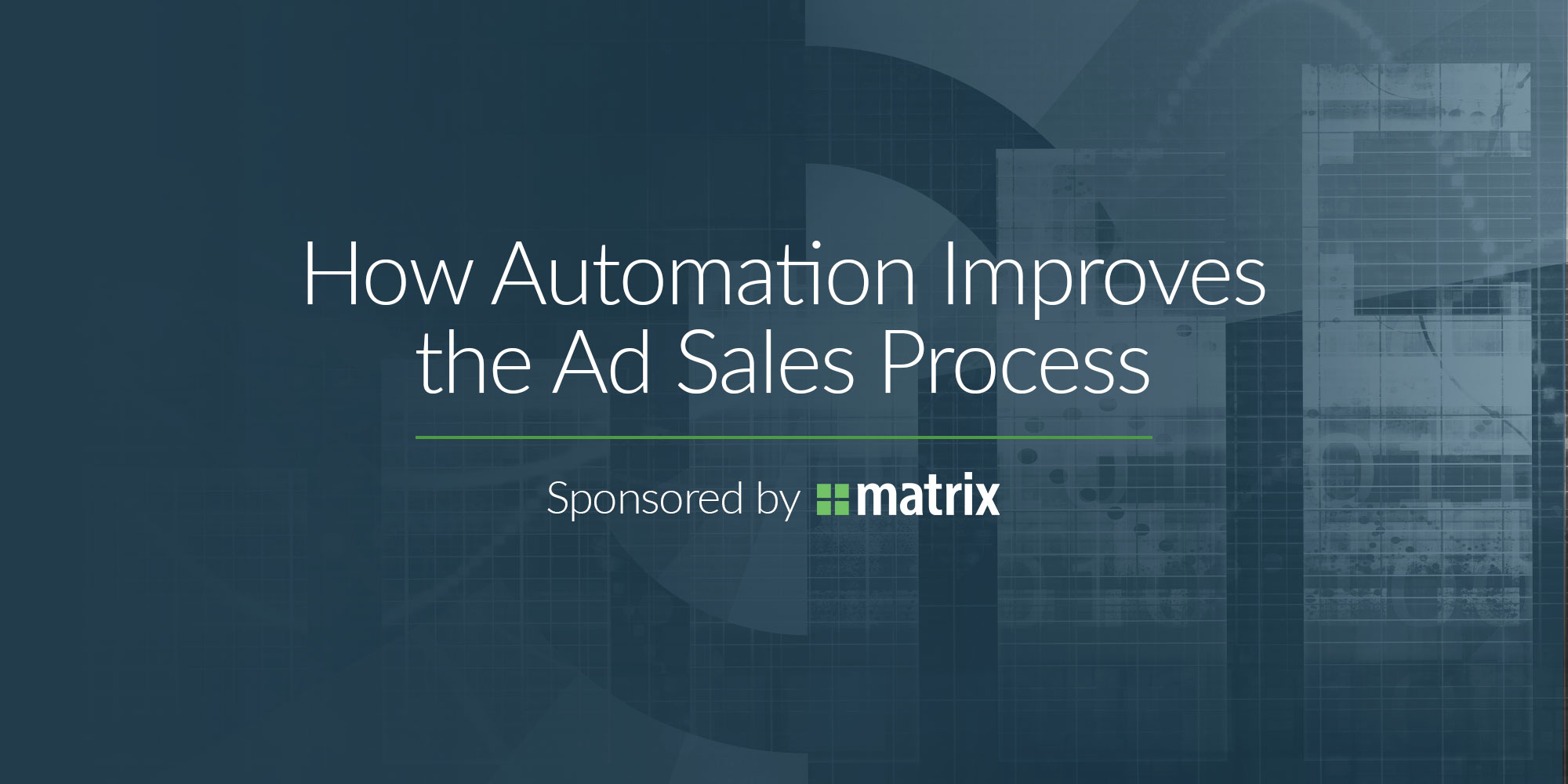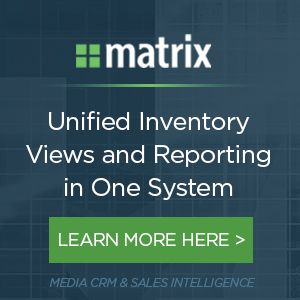How Automation Improves the Ad Sales Process

Sponsored Content by Matrix
Many participants in the broadcast advertising market have recognized that there are several opportunities to make improvements to the process of buying and selling ad placements. Some of these deal with growing the pie to more effectively compete against the behemoths of digital advertising. But even without radical change, there are ways to improve the current methods used for executing transactions. First and foremost is the need to increase the level of automation.
Both media companies and advertisers benefit by reducing the complexity of the ad buying process, and by making it more consistent across organizations. Advertisers benefit from simplified processes, reducing their internal costs, and relieving their staff from unnecessarily complex practices. Media companies benefit by improving their organizational responsiveness, thereby removing barriers that make their offerings harder to buy than those of their arch rivals, the digital media giants.
Streamlining “Make-Goods”
One aspect of broadcast advertising that is ripe for improvement is the “make-good” process, whereby a media company agrees to repeat an ad placement when the initial placement did not attain the expected audience level. In many markets, the process to resolve this can involve a back and forth negotiation between the advertiser and the media company. Any actions resulting from these agreements need to be tracked and reconciled.
Simplifying and automating the make-good process could greatly benefit media companies and their advertisers. By providing a mechanism to either preauthorize additional placements or to make the approval process less complex, many hours of labor can be saved. In addition, it makes sense to develop a method for routinely cancelling outdated transactions, in effect setting an expiration date for a make-good.

Opportunities for Innovation
Many other areas can benefit from a new, algorithm-based approach to advertising sales. With a more consistent set of transaction data across suppliers, forecasts will be easier to make. Advertisers will be able to gather and compare audience data more easily. Media companies will be able to more effectively manage their sales pipeline, and focus effort on developing new opportunities instead of simply servicing existing accounts. Lower transaction costs will benefit both buyers and sellers, and simplify the work of large advertisers running ongoing campaigns over multiple markets.
Automation can also improve the security of purchases and audience reporting. By using the latest techniques from the data communications industry, each transaction can be secured and properly recorded for tracking and follow-up, thereby eliminating the need for paper records and fax logs. Broadcasters can also deliver viewership reports securely, which are inherently free from the manipulation of pay-for-clicks and other dubious practices in digital advertising. These attributes can increase the relative value and improve the competitive position of television advertising gauged against digital ads.
MASC, the Media Ad Sales Council, comprised of thought leaders from across the media industry and representing different verticals and viewpoints, was recently formed to advance the media ad sales ecosystem through automation, convergence, and inclusion. The group is focused on identifying outcomes and workflows that will advance how television will be bought and sold within the next three years. This effort will help increase the pace of adoption of new technologies and improve cooperation between key stakeholders in this evolving marketplace.
Media-Focused CRM Adds Value
All kinds of media organizations are coming to recognize the benefits of augmenting their relationships with clients by using media-focused CRM (Customer Relationship Management) systems, such as the Monarch Platform from Matrix. Because of the multiple steps involved in media sales, generic CRM systems are ill-suited to the challenge of tracking customer inquiries, orders and reporting. With the changes that are currently underway in this market, including increased automation and standardization, having CRM systems that are not only positioned for the future of media sales, but that are advanced in optimizing inventory, aid in uncovering new revenue, and proficient in automating processeswill become crucial to the success of a wide range of organizations.
Explore how you can automate your ad sales and customer relationship management processes. Read more.

About Matrix
Matrix Solutions is a forward-thinking technology company that empowers the media ad sales world with intelligence, technology, and expertise. It provides the technology back bone for the end-to-end workflow for sales organizations, transacting in the media marketplace. Its flagship solution, Monarch, is the only global ad sales platform built specifically for media, delivering the CRM and business intelligence necessary to optimize inventory, while the Matrix Sales Gateway, serving as a sell-side dedicated platform allows for the ingestion and dissemination of data from all providers in the ecosystem that participate in the negotiation and execution process. Matrix manages more than $13 billion annually in media ad revenue, has over 10K users, maintains over 95% renewal rate, and has founded the annual Media Ad Sales Summit and Media Ad Sales Council (MASC) – both of which bring together industry leaders to advance the future of media ad sales. For more information, please visit matrixformedia.com.
The smarter way to stay on top of the streaming and OTT industry. Sign up below.
